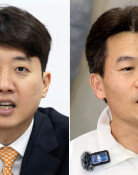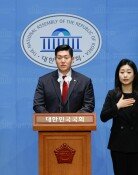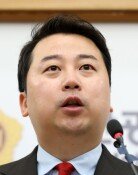Panel releases human rights guidelines
Panel releases human rights guidelines
Posted December. 16, 2005 08:34,
The National Human Rights Commission of Korea (NHRC) came up with its recommendations on the national human rights action plan (NAP) yesterday. The guidelines include a call for broader political freedom for civil servants and teachers, the abolition of state emergency arbitration in strikes, the repeal of capital punishment, and the abrogation of national security law and probation statutes.
Since the government was involved in the process, it is highly likely the government will accept most of the recommendations. Yet, the plan contains many points that liberals have pushed for, so passing the legislation will be controversial and create a stir.
The copy of the 130-page-long guideline has 27 points in three areas: nine points on civil and political rights, seven points on economic, social, and cultural rights, and 11 points on human rights for the socially underprivileged and marginalized.
The guidelines revise a law that uniformly and comprehensively prohibits civil servants political activities and open the way for the government employees and teachers to engage in political activities. This runs counter to the constitutional court ruling that limiting political activities of teachers is constitutional.
In an effort to strengthen labor rights, the NHRC also advises abolishing government arbitration in labor disputes, easing civil and criminal punishment for walkouts, restricting lockouts and the use of alternative workers, and reducing the number of public sectors considered crucial to the countrys economy.
Along with these measures, the commission recommends that every worker who contributes the same amount of work to a company be guaranteed an equal wage, work hours, benefits, and other working conditions, which will face strong opposition from management.
The NHRC recommends the abolition of the death penalty to improve the right to life, and it recommends the repeal of the national security law to ensure freedom of speech. The commission also mentioned that conscientious objection to military service should be allowed to ensure individual rights to religion and freedom, and that the alternatives to military service should be adopted.
The NHRC advised that the provision on assemblies limiting their place, time, and measures be eliminated or eased. This could lead to indiscriminate strikes and demonstrations, which may infringe upon the right to residence.
In order to ensure freedom of conscience and religion, the commission made it clear in its recommendations that a student should have the right to opt in or out of religious classes or religious events. This could fuel controversy in the recent revision of the private school reform bills.
Regarding the rights of the socially underprivileged and marginalized, the guidelines suggested revising the provision in the criminal code that limits victims of sexual assault to women, and sexual criminal acts to sexual intercourse, in an effort to protect homosexuals and the transgendered from sexual harassment.
One member of the commission said that with the implementation of the NAP, Koreas human rights situation will significantly improve.
The recommendations will pass through a plenary session of the NHRC early next year and will be sent to the government, which will then come up with detailed national action plans in line with the recommendations. The detailed plan will be implemented for five years, from 2007 to 2011.
Jae-Myoung Lee egija@donga.com







